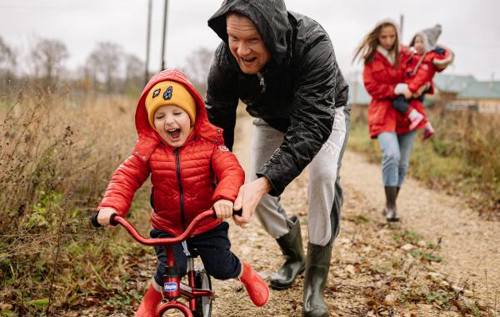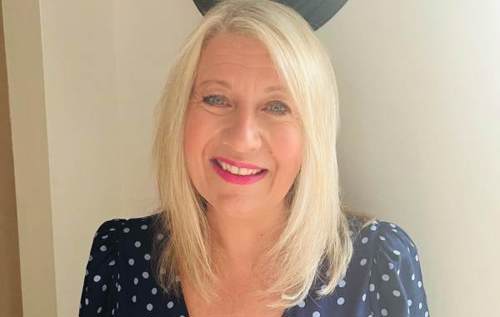Tips for parents and carers: How to support a child living with arthritis or a musculoskeletal condition
12 October 2023
If your child has just been diagnosed with arthritis or a musculoskeletal (MSK) condition, we know it can be a big adjustment.
It’s okay to not have all the answers. But there are steps you can take to support them, so they can not only cope, but thrive.
As part of a cross-charity project, we wanted to provide more support for children and their families living with arthritis.
Together, we talked to Dr Declan Jordan, clinical psychologist at Alder Hey Children's NHS Foundation Trust, to get his tips and advice for parents and carers.
Helping your child adjust to being diagnosed
 When your child has been diagnosed with a long-term health condition, it’s natural for them to feel a rollercoaster of emotions. At times, we know it can be nerve-wracking, confusing, or even a bit lonely.
When your child has been diagnosed with a long-term health condition, it’s natural for them to feel a rollercoaster of emotions. At times, we know it can be nerve-wracking, confusing, or even a bit lonely.
Dr Jordan says that parents and carers can support the young people in their lives by helping them develop a sense of acceptance.
“When we talk about acceptance, it can sound like a tricky term, but we're not talking about ‘giving up’,” explains Dr Jordan.
By accepting things as they are, rather than fighting against it, Dr Jordan says it may help the young person in your life focus their energy on what they can control. For example, they can focus on pacing themselves and looking after their wellbeing.
Aligning with their values
Between pain and fatigue, living with a musculoskeletal condition can make day-to-day tasks difficult. Sometimes life can feel a little smaller and we can lose touch with who we are.
“During those times when life feels like it’s shrunk, we've often lost connection to our values and what’s important to us,” explains Dr Jordan.
To address this, Dr Jordan suggests helping your child figure out their values, and living a life that aligns with them. “In the same way as a compass, values act as a guide," he says. "They can help us to make choices based on what direction we want our lives to go and who we want to be.”
Then Dr Jordan suggests helping them find actions that help them bring these values to life.
For example, if they value creativity, you could encourage them to pick up a new craft. If they value justice, they could volunteer for a cause that matters to them. Or if they value compassion, maybe you could encourage them to call a friend who is having a tough time.
Building confidence and self-competence
 Being diagnosed with a long-term condition can take a toll on your confidence. To help your child, Dr Jordan suggests:
Being diagnosed with a long-term condition can take a toll on your confidence. To help your child, Dr Jordan suggests:
- Helping your child identify and discover their strengths.
- Praising their strengths and supporting them to build on these.
- Avoid comparing them with siblings, other children, or other people with a musculoskeletal condition.
- Engaging in activities together as a family, doing things that everybody can join in.
- Encouraging the young person in your life to take an active part in decision-making.
Help them manage the differences in their lives
As the young person in your life grows up, they might become more aware of any differences between them and their friends.
“Understandably, this can at times lead to a sense of unfairness or hardship,” says Dr Jordan. “And while you won't always have the answers, you can try to be a supportive presence, someone who’s willing to listen and who your young person feels safe to express their emotions too.”
Set an example
 As any parent or carer knows, young people are often influenced by the people around them. For this reason, Dr Jordan says it’s worth considering how you talk about their condition, as it may influence how they think about themselves.
As any parent or carer knows, young people are often influenced by the people around them. For this reason, Dr Jordan says it’s worth considering how you talk about their condition, as it may influence how they think about themselves.
“The language we use can be really important,” says Dr Jordan. “So, where possible, try to avoid negative sounding language or terms like ‘you have something wrong with you’ or ‘disease’.
Try not to refer to treatments as being for illness. Instead, Dr Jordan suggests focusing on how the medication will keep them fit and well and allow them to continue their hobbies.
Encourage them to keep a diary
For some people, writing down what we’re going through can be a big help. So, it might be worth suggesting to the young person in your life.
This doesn’t have to be using pen and paper. You could also use an app or phone notes. Keeping a diary is a great way to express your thoughts and feelings. Plus, it might be useful if they wanted to share with their healthcare team.
Wellbeing Webinar
Get support yourself
As a parent or carer, it's natural to want to put your child first and protect them from harm. But the truth is, you need to look after yourself too, or you can be left feeling overwhelmed, exhausted and burned out.
Take time to do activities you enjoy, find ways to manage your stress and if you need support, don't be afraid to ask for it.
We’re here for you
Remember you can:
- call our helpline.
- join our online community.
- get support from our Young People and Families Service or other wider charities.
- sign up to our newsletter for the latest tips and advice on living well with arthritis.
You could also reach out to:
- Children’s Chronic Arthritis Association (CCAA)
- Juvenile Arthritis Research (JAR)
- Juvenile Idiopathic Arthritis at the National Rheumatoid Arthritis Society (JIA at NRAS)
- Lupus UK
- Scottish Network for Arthritis in Children and Versus Arthritis (SNAC).
If you need help for a mental health crisis or emergency, you should get immediate expert advice and assessment. Support is available, even if services seem busy.
A mother and daughter’s story: Sammy’s and Sophie
 Sammy’s daughter, Sophie, was diagnosed with lupus (SLE) when she was just 14-years old and it’s been an up-and-down journey.
Sammy’s daughter, Sophie, was diagnosed with lupus (SLE) when she was just 14-years old and it’s been an up-and-down journey.
Lupus (SLE) is a long-term condition that can cause symptoms like joint pain, skin rashes and tiredness (fatigue). It can affect different parts of your body, including organs like the heart, lungs, brain and kidneys.
“Psychologically the impact of having the diagnosis was very hard on Sophie,” says Sammy. “She went from being a very relatively healthy young girl to suddenly not. And, as a family, it was quite tough. I tried to be the strong one. I tried to make everybody better, but I wasn’t looking after myself.”
During her childhood, Sophie spent a lot of time in hospital, and it was a stressful time for the family. Exhausted and burned out, Sammy says she eventually crashed. “My body couldn’t take it anymore. I was at the end of my tether.”
Knowing she needed support, Sammy visited her GP and who put her in touch with a counsellor and psychologist. “It was the best thing that happened,” says Sammy. “Very slowly, after quite a few months, they put me back together again.
“They taught me that I needed to take a little time to step back so I could be in the best position I could be to support my daughter. That meant finding a little time for myself.” For Sammy, this means going out and getting some fresh air with the dog.
Sammy also suggests finding a community who can support you when things get tough. “Reach out to charities, reach out to the specialist nurses in your centre, reach out to close friends or family,” she says.
“It doesn't matter whether your child has just been diagnosed recently, if they’re eight, or 42, it’s hard for everyone. But, to me, the support I’ve build around me is absolutely priceless”
This content was created in partnership with:
- Children’s Chronic Arthritis Association (CCAA)
- Juvenile Arthritis Research (JAR)
- Juvenile Idiopathic Arthritis at the National Rheumatoid Arthritis Society (JIA at NRAS)
- Lupus UK
- Scottish Network for Arthritis in Children and Versus Arthritis (SNAC)
We would also like to thank Dr Alex Orchard, Lead Clinical Psychologist in Paediatric Rheumatology and Chronic Pain at Guy’s and St Thomas’ NHS Trust for their support creating this content.